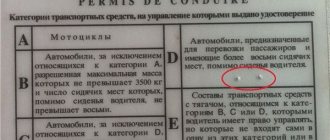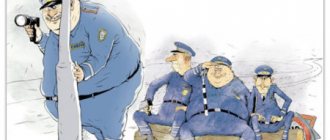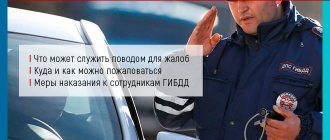All road users sooner or later encounter traffic police officers. Their presence on the road should ensure safety.
However, it happens that police officers themselves become perpetrators of crimes. In this case, a complaint against the traffic police inspector is a means of restoring justice.
It must be said that situations when a traffic cop becomes the culprit of a conflict on the road are quite common. The rights of motorists are violated all the time. Of course, we need to fight this. Information on how to do this is contained in this article. Read on.
How to complain to an employee's management
This possibility follows from the Law “On Police” and the Regulations of the Ministry of Internal Affairs. A complaint against a specific person is submitted directly to the head of his department, or to a higher organization. In case of inaction of an official who refuses, for example, to check the work of a subordinate, it is sent to his superiors or to the prosecutor's office (read about how to file a complaint about police inaction to the prosecutor's office).
You can write a complaint and submit it in person (orally or in writing), by mail (sent by registered mail with acknowledgment of delivery); The regulations also provide for other possibilities: electronic appeal through a special section of the traffic police website, or by telephone. In this case, a written request is preferable.
The applicant indicates the name of the organization to which he is applying (or the full name of the head of the unit), provides his details, the name of the official whose actions are being appealed, and sets out the essence of the case. Documents confirming the facts or copies thereof are attached to the appeal.
If the applicant’s surname is not indicated, the text is illegible, the appeal itself contains insults, no substantive answer is given, or the citizen will be warned about the inadmissibility of abuse of rights.
An appeal to the prosecutor's office is considered no later than 30 days from the date of registration.
Where to file a complaint against a traffic police officer? How to write a document? Answers in the video.
If the document submitted to management did not help
This often happens: no one likes to “wash dirty linen in public.” The response must explain the procedure for appealing the decision.
(Art. 258). The citizen can then appeal to a higher authority of the Ministry of Internal Affairs, the prosecutor's office or the court.
Article 258 of the Regulations
If, as a result of the inspection, the circumstances noted in the complaint are confirmed, indicating the illegality of any actions, the inconsistency of these actions with the provisions and instructions of regulatory and other documents, the complaint is recognized as justified and measures are proposed to punish the perpetrators and restore the violated rights of the applicant. In this case, the response provides for an appropriate apology to be made to the applicant. If the complaint is found to be unfounded, the response provides explanations regarding the unlawfulness of the claims made, as well as, if necessary, a possible procedure for appealing the decision taken on the complaint.
What complaints should be sent to court?
Controversial situations. If you complain to the traffic police and the inspector refuses, you have the right to go to court. The judge will resolve the dispute, and if he also refuses, you can appeal to a higher court. For example, complain about a decision of a district court to a city court.
Procedural violations. For example, there are no eyewitnesses or witness statements are drawn up with errors. This may convince the judge, and he will cancel the order.
Incorrect application of the law. For example, an inspector drew up a protocol for the headlights of a parked car not being lit.
Compilation and application
This document, addressed to any of the authorities, is drawn up in basically the same way, therefore, it makes sense to consider this issue in general.
First, you need to indicate where the document is being sent
- in the upper right corner of the sheet. If it is addressed to a specific official (the boss of the offending employee), then you need to enter his full name and title, preferably in full.
Next - the applicant’s data, including address, you can specify passport data. Then - information about the person whose actions (inactions) are being appealed: full name, badge number, ID number, official vehicle number (state and on-board) and other known information.
The appeal is referred to as a “statement” or “complaint” in the center of the page.
The following describes the essence of what happened.
It is advisable to write briefly and to the point, and after compiling, show the text to a professional or person experienced in such matters.
The text must indicate the time and place of the incident, describe the entire situation in detail: what the employee committed illegally, refer to the relevant clauses of the legal act that were violated.
For example, the norms of the Federal Law “On Police”, such and such a clause of the Administrative Regulations, approved. pr. 185 of the Ministry of Internal Affairs, etc. If a police officer exceeded his official powers or insulted him, this is a reason to refer to articles of the administrative code.
In the “pleading” part, the applicant can insist, for example, on conducting an internal audit, bringing the employee to justice (disciplinary and administrative), and if he committed a crime, then in a statement to the prosecutor’s office - even criminal liability.
Often victims of police arbitrariness “ask” for financial compensation. In fact, it can be difficult to obtain, or it is paid in an insignificant amount.
The evidence available to the person is attached to the application. These can be documents (copy of the protocol), audio and video recordings
(according to Article 25 of the Regulations, the police do not have the right to interfere with them), witness statements, etc.
Article 25 of the Regulations
An employee must not interfere with the use of video and sound recording equipment by a road user, unless prohibited by law. The employee must inform the road user making the recording about the existence of the prohibition.
A witness can be any person who has information about what happened: a passenger who observed the arbitrariness from inside the car, a passer-by (if it is possible to obtain his consent and data), another driver who was present when the victim communicated with the policeman. If a protocol was drawn up on the spot, then the witnesses must be included.
In this case, it must be indicated that
the signatory “does not admit the fact of the offense” and “does not consider himself a violator.”
The document, including to the court, can be sent by registered mail with acknowledgment of receipt or delivered in person. In the latter case, you need to receive a written note of acceptance (coupon, signature on a copy, etc.) indicating the date, or better yet, the hour, the name and position of the person who accepted it.
Complaint to the prosecutor's office about unlawful actions of a traffic police officer
If an illegal decision of a traffic police officer to bring to administrative responsibility for violating traffic rules during a road accident is subject to appeal, then a complaint against the decision on an administrative offense will be required. In such cases, it is possible to challenge the procedural documents drawn up by the inspector at the scene of the accident and after it was recorded.
Fearing that by refusing to be tested at the specified level, a protocol of refusal to be examined would be drawn up against me, I passed the test, despite the absence of attesting witnesses. According to the police officer, the test was positive. I began to insist on a medical examination, since I did not drink alcohol and refused to give money.
Then, having stopped two drunken men passing by, __________ entered them as witnesses in the examination report and, in their presence, drew up a protocol on my removal from driving, distorting the time of drawing up the protocols. Then both inspectors began to draw up some papers without my participation, copies of which were not given to me. Their content was not announced to me, the text was not read out. To my requests to explain what was written there, the police refused.
If at the same time the inspector independently opened the trunk, hood or doors and there is testimony or other evidence to support this, then it is necessary to indicate this here because this draws on the article “Excess of official authority” because this is classified as a search, and the search is carried out only with prosecutor's sanctions).
Throughout the entire time of communication with the inspectors, the inspector behaved aggressively towards me, putting psychological pressure on me. Thus, he violated the requirement of Article 19 of the Order of the Ministry of Internal Affairs 185. Considering the above, I ask: 1. Initiate an administrative case against the traffic police inspector under Article 19 ,1 Code of Administrative Offenses of the Russian Federation “Arbitrariness.”2.
It must indicate:
- the name of the authority to which it is sent;
- Full name of the applicant;
- phone number;
- place of registration, residence of the applicant.
At the beginning of the complaint, you need to provide maximum information about the traffic police officer who violated the law, indicating:
- his full name;
- job title;
- workplace;
- available contact details;
- basic data from the ID with the token number;
- license plate number, side number of the vehicle of the traffic police representative (if there was a vehicle).
IMPORTANT! The more data regarding the representative of the state traffic inspectorate is indicated, the faster measures will be taken for the illegality of his actions.
Where and how to complain about unlawful actions of traffic police officers The procedure for citizens to file complaints against officials, regulated by the Civil Procedure Code of the Russian Federation, is duplicated in all specialized regulations.
In this case, a higher authority will support the side of the policeman against whom the driver made claims. You need to submit a statement to the prosecutor's office after you have used the opportunity to complain to your superiors about an employee who has violated the law.
How to complain In order for the applicant’s actions to have a positive result, you need not only to be confident in the validity of your accusations against the traffic police officer, but also to know how to write a complaint. The procedure regulating the possibility of citizens turning to the prosecutor's office is regulated by the Code of Civil Procedure, which describes in detail the procedure for drawing up and submitting such complaints.
If the complaint is being considered by the court, then the applicant must indicate exactly what factual circumstances relevant to the case can be confirmed by the invited persons. Possible nuances For some reason, many people think that passengers in the car cannot act as witnesses in the case, since they are stakeholders.
But in accordance with the legislation of 2021, it is possible to use witnesses in a vehicle in any situations and circumstances of the case.
Therefore, if during communication a traffic police officer behaved unlawfully, showed disrespect, or insulted the driver in the presence of passengers, then they have the right to act as witnesses.
There is no general application form for a complaint to the boss of the offending employee.
When writing, you should rely on Article 131 of the Code of Civil Procedure of the Russian Federation, which describes how the application should look like.
How and to whom to complain about the action or inaction of a traffic police officer - instructions on how to defend your rights
- Introductory. This includes the “header” of the document. Be sure to find out the full name of the body where you are filing the complaint, and the initials of the chief. Don't forget to include your full name, residential address and contact phone number. After the “header”, in the middle of the line, write the name of the document, without quotes and a period – in our case, “Complaint”.
- Content, or main part. Here you must reveal the whole essence of your appeal. Indicate all information regarding illegal actions or inactions of the traffic police officer, enter all his data that you know.
- Final. Don't forget about the documentation base here. Indicate where you have already contacted to solve the problem, who witnessed the violation, what materials are available - these could be photographs, videos or audio recordings. It is better to include all documents in a list. At the end, be sure to put your date and signature with a transcript.
When writing in the header of the document, indicate the full name of the boss and the name of the department to which you are applying.
You can also simplify the form without specifying your requirements - as, for example, in court, you just need to write: “I ask you to look into this situation and bring the offender to justice.”
We invite you to read: Age limit for a Federal Penitentiary Service employee new law
A statement to law enforcement agencies or a court is almost the same.
- At the beginning, on the upper right side of the sheet, indicate the full name of the institution or authority you are applying to. Don't forget to include your address and contact information.
- Describe briefly but clearly what happened. Enter all the necessary information.
- Indicate what damage was caused due to the violation.
- Describe where you have already applied and to what authorities.
- State your requirements.
- Prepare a documentation base, list all the materials confirming what happened.
Writing an application to the court and prosecutor's office is a complex process. The main thing is to write a statement without errors, corrections, with a full description of the violation that occurred.
Still have questions? Just call us:
Going to court
The Code of Civil Procedure gives a citizen the right to appeal the actions of an official. The application is submitted at the place of work of the police officer or at the place of residence of the citizen.
A preliminary appeal to superiors or the prosecutor's office does not prevent judicial recourse.
Not only in the case when the citizen did not receive an answer, but even when the answer is negative and his complaint was refused.
The deadline for filing an application is within three months from the date of violation of rights, but the court will accept the application even if the deadline is missed.
The citizen’s appeal is considered by the court within ten days in the presence of himself, the official (head of the body), and witnesses.
If the court finds that the contested action was committed in violation of the law, it obliges the traffic police to eliminate the violation in full and report the results to the applicant and the court.
Challenging the illegal actions of traffic police officers is not only the right of a citizen, confirmed by the Constitution and laws, but also the civic duty of everyone. This applies to both drivers, who become direct objects of selfish or selfish interest, and ordinary citizens, who must understand the importance of combating official crime and arbitrariness, and not be afraid to act as witnesses, including in court.
The law today provides ample opportunities to defeat arbitrariness on the road, to punish the guilty employee disciplinaryly, financially, and even criminally.
Any road user in respect of whom the law has been violated can file a complaint against the actions of a traffic police officer. The illegality of actions will be checked by the court, the prosecutor's office or higher officials of the Ministry of Internal Affairs - depending on the nature of the violation. In this article we will look at the grounds on which a complaint can be made and what consequences occur if it is satisfied.
Comments
Achieving justice in a dispute with the police will not be easy.
When filing a complaint about police misconduct, it is important to comply with the following laws:
- do not miss the deadline for appeal. The law on the procedure for considering citizens' appeals for appealing the actions of government bodies allows thirty days. You can file a lawsuit within three months from the day your rights were violated. You can miss a deadline only for good reasons;
- substantiate the complaint or statement of claim. Nobody will believe the words. We need evidence that you are right, and not the traffic police officer.
Don't waste time, collect evidence in your favor:
- film with a video recorder, record what is happening with a mobile phone camera;
- record information about witnesses;
- indicate where you disagree with the inspector when drawing up the protocol.
What can you file a complaint about?
The powers of a traffic police officer include ensuring traffic rules, identifying and suppressing traffic violations, drawing up procedural documents after an accident or to bring citizens to administrative responsibility. When exercising these powers, not only the Traffic Rules, but also other legislative acts must be observed.
The list of the most common violations by the traffic police inspector that citizens may encounter includes:
- violation of procedural rights when drawing up administrative protocols and decisions - refusal to exercise the right to defense, refusal to take into account objections and explanations in the text of the protocol;
- unlawful actions related to stopping transport and checking documents - an unreasonable demand for documents, violation of regulations when communicating with a driver or other traffic participant;
- violation of the procedure for processing documents - refusal to call witnesses to draw up acts, refusal to provide your personal data and registration number;
- extortion of a bribe for detected traffic violations;
- unlawful actions when sending citizens for a medical examination - refusal to explain the identified signs of intoxication, refusal to provide information about the verification of the examination device;
- unlawful confiscation of a driver’s license form, if the car owner was not deprived of his rights by court order;
- illegal decision to evacuate a parked car if the driver is driving;
- other categories of violations.
Already when drawing up a protocol or other procedural document, a citizen can exercise the right to appeal. To do this, you need to require the inclusion in the documents of explanations and objections that the driver considers important for assessing the circumstances of the case.
Other options for challenging can be used after receiving the protocol or the traffic police officer’s refusal to issue the specified document.
The procedural protocol is not subject to appeal, since the violator can present all objections during its consideration. However, violations committed during the preparation of the protocol may be the subject of a complaint. Depending on the nature of the unlawful actions or inaction, a complaint can be filed in the following areas:
- to a senior official of the Ministry of Internal Affairs - in case of violation of the regulations of the Ministry of Internal Affairs when checking documents or communicating with the driver, in case of refusal to provide personal data, registration number, etc.;
- to the prosecutor's office - on any facts related to violations of the law;
- to court - if a citizen challenges a previously issued refusal of other authorities or if he is appealing against the recognition of the culprit when registering an accident, etc.
Appealing to higher officials of the Ministry of Internal Affairs or the prosecutor's office does not deprive the right to file a complaint in court.
To file a complaint, you must have evidence of unlawful actions on the part of the traffic police representative. For this you can use:
- written evidence - protocols with the driver’s objections, diagrams of the accident site, other forms and forms;
- material evidence - the results of an independent examination, audio and video recordings, including from the car’s DVR;
- witness statements;
- materials of administrative, criminal and civil cases.
It is advisable to use the services when preparing a complaint in order to avoid refusal to consider it.
When filing a complaint, you must have information about the official whose actions violated the law and the interests of citizens. As a rule, this information is indicated in the protocol. If it is impossible to determine the name, position and registration number of the inspector from the contents of the protocol, the citizen has the right to contact the traffic police to clarify this data.
The law contains a number of mandatory requirements for filing complaints against the actions of government officials. First of all, it is necessary to indicate the identity of the applicant, since anonymous applications are not subject to consideration. The complaint must be presented in the form of a written document, and oral appeals must be registered at a personal reception of citizens. The text of the complaint also indicates the following points:
- name of the official or body to which the complaint is sent;
- information about the applicant and the official whose unlawful actions are being disputed;
- circumstances of the violation - place, time of drawing up and protocol number; the nature of the violated norms of law and the interests of citizens; list of illegal actions of the traffic police inspector;
- reference to evidence that supports the arguments of the complaint;
- reference to a rule of law or traffic rules that was violated by a traffic police representative;
- a request to recognize the actions or inactions of a traffic police officer as illegal, to cancel procedural documents, and to take response measures against the culprit;
- date and personal signature of the applicant.
For example, when filing a complaint about a violation of the law when recording the results of an accident, you need to indicate the place and time of the accident, a list of witnesses, state the circumstances of the accident and the rule of law that was not followed by the inspector. A complaint about the actions of a traffic police officer during evacuation must contain information about the lack of rights to forcibly move the car (for example, if the driver was driving and was ready to eliminate a violation of parking rules).
The regulated period for consideration of a complaint is 30 days, and citizens are notified of the results of the inspection in writing. Depending on the nature of the violation and the requirements of the complaint, the following consequences may occur:
- cancellation of procedural documents drawn up in violation of the law (for example, if a traffic police officer refused to call witnesses to confirm the fact of refusal of a medical examination);
- return of a driver’s license or other documents unlawfully seized by an inspector;
- bringing the guilty person to administrative or criminal liability (for example, for abuse of power or extortion of a bribe);
- taking disciplinary measures against the guilty traffic police officer, including his dismissal.
If grounds for criminal prosecution are identified, the applicant may be recognized as a victim. Upon initiation of a criminal case, a resolution is drawn up, with which the complainant must be familiarized.
If, during the consideration of the complaint, violations of the legal rights and interests of the traffic participant are confirmed, you can file a claim for compensation for moral damage. Such cases are considered in lawsuit proceedings, and materials on verification of the complaint will be presented to the court as written evidence.
Economist. More than 15 years of experience in finance. Date: May 4, 2018. Reading time 7 minutes.
Keeping order and safety on the roads is one of the main tasks of a traffic police officer. When a police officer’s work priorities are different, the rights of citizens and other persons are violated. The solution would be to file a complaint against the negligent traffic police officer. The applicant has a choice: senior management, the prosecutor's office or the court.
Few motorists have not encountered on the road this guardian of order and road safety, popularly called a traffic cop. Drivers have different impressions and results from these meetings. Some of them are familiar firsthand with such a document as a complaint against a traffic police officer and how to prepare and submit it.
Table 1. Which actions (inactions) and decisions of a traffic police officer can be appealed and where. Source: traffic police. RF
Where can you file a complaint?
There are several options where you can file a complaint regarding unlawful actions of traffic police officers.
Depending on the severity of the violation, you can complain against a police officer:
- immediate superiors;
- to the prosecutor's office;
- to court.
The most effective method that guarantees consideration of the driver’s complaint and bringing the offender to justice is filing an application with the court . But this is not required in all cases.
You can complain about police officers to both senior management and the prosecutor's office. Before filing a complaint, it is necessary to ensure that the accused actually committed unlawful acts.
Traffic police officers have fairly broad powers. This must be taken into account, because it often happens that the complaint is not relevant and higher authorities support the side of the police.
All actions and inactions of inspectorate employees are regulated by law. But there are quite a lot of laws that are rules of conduct for traffic inspectors.
If the driver is confident in the unlawful actions of the traffic inspector, he immediately has the question of which prosecutor’s office to file a complaint against the traffic police. In this case, you can also complain to the authority at the place of work of the traffic police officer who is abusing his position.
Sometimes a verbal complaint is enough, but this is quite rare . After all, there are unscrupulous traffic inspectors in almost every department, and most bosses know about them.
The way out of this situation is to call the traffic police helpline number. In this case, you should indicate all the information that relates to the situation.
When all of the above appeals are unsuccessful, then the only way to influence the traffic police officer remains.
This is filing a complaint with the prosecutor's office or judicial authorities. In this case, it is important to know how to write a complaint against a traffic police officer to the prosecutor's office.
Regulatory framework for the service of traffic police officers
The main document regulating the general issues of the activity of this police force is Federal Law No. 3-FZ of 02/07/2011 “On the Police”. Some responsibilities are as follows:
- clearly know and comply with Russian laws and other regulations;
- perform your duties in accordance with the job description;
- when performing service, respect the interests and rights of citizens, organizations, public associations;
- provide first aid to victims (for example, in a traffic accident);
- comply with lawful instructions and orders of management;
- suppress administrative violations;
- conduct proceedings in cases of administrative offenses;
- not to disclose information that became known to him while on duty.
Responsibilities
The duties of a traffic police officer are described in detail in Order of the Ministry of Internal Affairs of Russia No. 664 dated August 23, 2017 “On approval of the Administrative Regulations for the execution by the Ministry of Internal Affairs of the Russian Federation of the state function of exercising federal state supervision over compliance by road users with the requirements of the legislation of the Russian Federation in the field of road safety” . According to this document, he has the right:
- check the identity cards of citizens when there is reason to suspect them of committing an unlawful act and whether they are wanted, as well as when a protocol on an administrative offense is drawn up against them or detention measures are taken;
- demand the cessation of illegal actions by citizens or officials;
- summon persons to the police in cases of administrative violations of law and obtain from them explanations, certificates or other documents, order forced detention in relation to those who evade voluntary appearance when summoned;
- send motivated requests and receive answers, certificates and other documents free of charge from citizens, officials, public associations, organizations, institutions (including medical);
- patrol settlements and public places, set up posts and barriers;
- require citizens to leave the scene of an administrative offense, crime, or incident when it is necessary to record the circumstances of the incident and preserve traces, as well as to ensure the safety of the citizens themselves;
- draw up protocols on administrative offenses and collect evidence on them;
- deliver or refer citizens for a medical examination for intoxication (alcohol, drugs), as well as conduct an examination for alcohol intoxication themselves in accordance with the established rules;
- carry out personal searches of persons, things and vehicles, if there is information about the presence of prohibited substances and objects (weapons, drugs, explosives), seize found prohibited substances and objects when a person does not have the right to transport and store them legally (for example, no permit to carry weapons);
- stop the vehicle, check its documents and the right to use it, remove the driver from driving, detain the vehicle;
- use audio and video equipment, information systems, cameras, and other technical and special means in work;
- in urgent cases, use vehicles of citizens, organizations, institutions (pursuit of a criminal, suppression of an illegal action, delivery of a victim to a hospital).
Also, the duties of a traffic police inspector are enshrined in his job description. Failure to fulfill or improper performance of assigned duties, as well as inaction in certain situations may lead to appeal in the prescribed manner.
Complaint against a traffic police officer
To guard safety and order on the roads, showing respect for others, professionally performing their duties - this is the main task of a traffic police officer. But, apparently, not for all employees of the State Traffic Inspectorate. And the driver, even if he is in the right in the situation, caught by such a would-be inspector, may receive wrongful treatment, face poor treatment, and sometimes even illegal behavior of law enforcement and security guards. In this case, there is nothing left to do but file a complaint with the traffic police or contact the prosecutor's office or court.
Reasons for filing
Reasons for filing a complaint may be:
- a protocol drawn up illegally (on an administrative offense, on administrative detention, on a personal search, and others);
- inappropriate behavior of a State Traffic Inspectorate employee (for example, he took away and broke the driver’s mobile phone, on which he was filming his communication with a law enforcement officer);
- failure to include explanations of a person or witnesses in the protocol;
- when checking documents, the inspector demands to see a paper OSAGO policy, ignoring.
Interesting!
In December 2021, the Russian Ministry of Internal Affairs conducted a study of public opinion on the activities of State Traffic Inspectorate employees. The work of the traffic police is considered effective and generally assessed positively by 57–58% of respondents. 64% of respondents have not encountered any corrupt actions by employees over the past year, and 36% answered in the affirmative. Contacts of traffic police officers with drivers who violated traffic rules were ranked first among illegal actions.
Submission forms
There are the following forms for filing a complaint against a traffic police officer:
Table 2. Complaint forms. Sources: traffic police. Russian Federation, Ministry of Internal Affairs. RF
What to write in a complaint against a traffic police officer
The appeal must contain the following information:
- name and address of the authority where it is submitted;
- name and details (last name, first name, patronymic, title, place of work) of the traffic police officer against whom the complaint is being written;
- information about the applicant (last name, first name, patronymic, address and telephone number);
- when submitted by a representative, his data is entered, as well as the data of the power of attorney with a copy attached;
- the essence of the complaint and what the applicant requires;
- supporting documents (if available, attached in copies; if they are not on hand, but are available in the materials of any case, then the applicant writes a request to request them);
- date and signature of the applicant (or his representative).
The style of writing a complaint is formal, businesslike, restrained, without emotional overtones or insults.
Where to file a complaint against the actions of a traffic police officer and a sample appeal
A complaint against a road safety custodian is submitted to:
- Ministry of Internal Affairs or State Traffic Inspectorate (to the immediate superior, senior manager or to the territorial ministry);
- prosecutor's office (addressed to the prosecutor of a city, district or subject of the Russian Federation);
- court at the place of service.
Below is a sample complaint against the actions of a traffic police officer.
How long will the review take?
A complaint received by the State Traffic Inspectorate (MVD) or the prosecutor's office will be considered within thirty days from the date of its registration. The period can be extended by 30 days (if it is necessary to request additional documents, check information, etc.). The applicant will be notified of this.
An appeal against a court decision is returned to the person who sent it within 7 days from the date of registration. The unreadable complaint is returned to the applicant within the same period.
When a complaint is not answered
A response to an appeal is not prepared if:
- the surname or address of the applicant is not indicated;
- the issue has already been resolved and an answer has been given;
- the court decision is appealed (the complaint is returned to the applicant with an explanation of the proper procedure for filing);
- the complaint contains obscene language and threats against a police officer and his family members;
- the same complaint is sent multiple times regarding the issue (a decision is made to terminate correspondence with the applicant, of which the latter is notified);
- the appeal is addressed to a body or official who is not competent to resolve it (sent according to jurisdiction with notification to the applicant);
- the answer cannot be given without disclosing information constituting a state or other secret protected by law;
- the complaint cannot be read (it is written illegibly and the applicant’s data is not readable).
The above list is exhaustive and for other reasons it is impossible not to prepare a response to the complaint.
Consideration of a complaint against a traffic police officer in court
An appeal against unlawful actions or inaction of a traffic police officer in court will take place based on a filed administrative claim. Its form must comply with the requirements of the Code of Administrative Proceedings of the Russian Federation dated 03/08/2015 No. 21-FZ.
The period for filing such a claim is 3 months from the date on which it became known about the violation of rights, interests and freedoms. If this period is missed, this is not a basis for refusing to accept the claim. The court may restore the deadline if it finds the reason for missing a valid reason. As a result, the court satisfies the complaint in part or in full or refuses to satisfy it.
An appeal of a decision in a case of an administrative offense made by a traffic police officer to a court is possible within 10 days from the date of its receipt. A deadline missed for good reasons may be reinstated by the court.
Higher education. Orenburg State University (specialization: economics and management of heavy engineering enterprises). May 4, 2021.
There are often situations when traffic police officers, taking advantage of their position, illegally impose fines on those drivers who do not violate traffic rules. In addition, there are other situations in which the traffic police inspector is wrong in relation to the driver.
However, many motorists find it easier to accept a fine or other administrative punishment than to complain about the inspector and prove the correctness of their actions. But in fact, a complaint about unlawful actions of traffic police officers is quite simple to draw up. We will tell you how to do this in this article.
When can you complain about traffic cops?
The question of holding traffic inspectors accountable should arise when they commit actions or inactions that are contrary to the norms of the law.
A complaint against the actions of a traffic police officer must be substantiated. This is the primary condition for it to be considered.
So how do you define misconduct by police officers?
There are several criteria for this:
- Check their requirements for compliance with legislation. For example, the requirement to provide the opportunity to unhindered inspection of the car, undergo various examinations, and so on.
- Find out the limits of measures permissible for use. This applies to cases when police have the right to use force or service weapons, as well as other special means.
- Make sure that the events that occurred on the roadway are correctly classified. That is, whether a violation was committed by the driver, and how it is reflected in the protocol on the administrative offense. This is important when determining the degree of guilt of the driver, forced evacuation of the vehicle, and so on.
Only after making sure that the actions of the traffic inspectors were unlawful can you file a complaint against the traffic police inspector.
Submission methods
There are several ways to notify higher authorities about a traffic police officer who has violated the rights and interests of a motorist:
- The driver can submit the application in person. To do this, he needs to have 2 copies of the document on hand. One remains with the authorities, and on the second the person who accepted it puts a signature and the date of acceptance, after which he gives it back to the applicant;
- The appeal can be sent by registered mail, using the service of notification of delivery;
- Via the Internet using the official websites of departments.
What should a complaint against a decision contain?
Destination. Indicate the position with the full name of the institution and the name of the recipient. It is best to send a complaint to the head of the department whose employee issued the fine. Another option is to indicate the name of the head of the regional traffic police department; he can be found on the inspection website in the “Leadership in the region” section.
If you are writing a complaint to the court, indicate the name of the court, for example Sovetsky District Court of Krasnodar.
Title of the document. Usually this is “Complaint against the decision...” in the center of the sheet.
These resolutions. At the beginning of the text, indicate which document you are challenging - with the number and date. Also copy down from it the position and name of the inspector who issued the fine.
Arguments. Write why you think the decision is wrong and refer to the articles of the law. To draw up a competent document for the court, it is better to contact a lawyer.
Resolution part. At the end, clearly list what you are asking to do: cancel the fine and terminate the proceedings.
Applications. Attach documents to your complaint that support your position. For example, if another driver was driving, you need a compulsory motor liability insurance policy and written evidence of the real offender.
Signature and date. At the end, put today's date and sign.
Sample complaint to the court against the decision of the traffic police. Open, copy and fill
How to apply online
If the driver does not have a lot of time and patience, he can file a complaint from the official website of the traffic police. You can do this as follows:
- On the main page of the traffic police website in the top menu you need to select “Services” - “Reception of requests”;
- Then a page appears with information regarding requests, after studying which you need to click on the button “Proceed to fill out the application form”;
- Immediately after this, you are asked to select the region to which the appeal is sent;
- After specifying the region, you can begin filling out the form, where you must indicate the following: driver’s full name;
- In what form does the driver want to receive a response: by email or regular mail?
- Text of the appeal;
Appeals containing incorrect personal information or containing offensive language are left unanswered by the traffic police.
Info
The period for consideration of electronic applications is 30 days from the date of their registration. Applications are registered within 3 days from the date of receipt. In special cases, consideration of the application may take another 30 days, of which the applicant is notified in advance.
How to compose
When drawing up a written complaint against a traffic police inspector, you should remember the rules for writing these types of statements:
- The header of the application indicates:
Full name of the body to which the complaint is addressed; - Address of this authority;
- Full name of the applicant;
- Applicant's address;
- The circumstances of the incident;
Time limits relevant to appeal
When writing a complaint against a traffic police inspector, you must remember the statute of limitations and the time frame for the prosecutor’s office to consider the issue on its merits.
The time after which it is permissible to complain to the police largely depends on the qualifications of the events that occurred. This refers to a specific act guilty committed by traffic police officers.
They are divided into the following groups:
- Official violation.
- Administrative offense.
- Crime.
When a complaint about unlawful actions of a traffic police inspector is considered, the sanction that can be applied as punishment is identified. And here the law in which this measure of responsibility is prescribed will play an important role.
As a rule, these deadlines are not violated, since the applicant himself tries to restore justice as quickly as possible. The statute of limitations for bringing to justice is the topic of another article. We'll talk about the time frame for responding to a complaint.
So, with regard to the time allotted for making a decision on the merits of the main issue of the complaint, after receiving the entire package of documents, the prosecutor is obliged to check the accuracy of all the data provided by the applicant within three days.
After which he must make a decision on measures to be taken against violators, or on refusal to satisfy the citizen’s demands. In some cases, this period may be extended to ten days.
Often these deadlines are violated for objective reasons. This is due to the request for additional information, or the transfer of a complaint within the jurisdiction.
What do you need to remember when writing an appeal?
- The statement is an official document, so emotionality will be unnecessary here;
- When writing a complaint, it is best to use a business style of communication rather than a conversational one;
- Insults, obscene language and slander are unacceptable, as this can lead to unpleasant consequences: A complaint against a traffic police officer will remain unanswered;
- Due to insults, a counterclaim may be filed against the driver;
When can I file a complaint?
The Prosecutor's Office is a public service charged with upholding the civil rights of citizens. That is why a complaint against a traffic police officer is filed there only if the traffic police inspector or one of the department employees has somehow violated your rights as a citizen.
Due to the fact that the traffic police inspector is an official, the range of situations in which he can deliberately or accidentally violate human rights is very wide. These can be violations of work standards, as well as ordinary incompetence in performing duties. As an example of situations in which a complaint is filed with the prosecutor's office against the traffic police, the following can be mentioned:
- The inspector did not provide all the necessary documents, but nevertheless demanded an inspection;
- The inspector stopped the car for inspection without any reason;
- The traffic police inspector was rude, rude, and in case of conflict refused to give his full name, rank, or indicate the department to which he was assigned;
- The traffic police inspector carried out an inspection or examination without reason or with violations;
- The traffic police inspector issued a fine unfairly or unreasonably.
These are only the most basic cases in which a complaint is filed with the prosecutor's office. It should be remembered that almost all violations in the work of the traffic police can in one way or another affect the rights of the driver as a citizen. Remember - the traffic police inspector is an official, and any use of his official powers may become the basis for filing a claim.
Statement results
Having considered the applicant’s appeal, the higher authority makes one of the following decisions:
- No changes are made to the traffic police inspector’s resolution, and the applicant’s complaint is not satisfied;
- Changes are being made to the resolution of the traffic police officer;
- The traffic police decision is subject to cancellation, and therefore the proceedings in the case are terminated;
- The decision is canceled and the case is subject to a new consideration.
To the Head of the MREO traffic police of Chelyabinsk
from Ivanov Ivan Ivanovich
living Moscow, st. Novorucheynaya, 2
Statement
Please let me know which vehicles are registered in my name and whether there are restrictions on deregistration of these vehicles. Please indicate all unit numbers for later filling out an application for writing off these vehicles.
Please send your answer to the address: Moscow, st. Novorucheynaya, 2.
Sincerely,
Ivanov I.I. ____________
Sample application for on-site inspection of a vehicle
Dear Sergey Anatolyevich!
I plan to deregister my GAZ21 car, license plate K567OR76, in the near future. I am not able to provide the car for verification of units at the State Traffic Safety Inspectorate, since the car has not been in use recently, the compulsory motor liability insurance has not been issued for it, the SOP and the title have been lost. I ask you to organize an on-site inspection of this vehicle, I can deliver the traffic police inspector to the parking lot (Moskovskaya St., 5) on my own.
Sincerely,
Ivanov I.I. ____________
Sample complaint against the actions of traffic police officers
Dear Sergey Anatolyevich!
I draw your attention to the unlawful actions of your employees. On June 10, 2010, I applied to the MREO of the State Traffic Safety Inspectorate of the Chelyabinsk Department of Internal Affairs to temporarily register my VAZ2101 car, license plate X777ХХ199. Inspector Sidorov, after reviewing my material, left to check the car against some database, after which he returned and said that it was not in the database where the car should have been placed after registration. And that I must personally go back to Moscow and demand from the traffic police, where the car was registered, so that the information appears in the database. At the same time, inspector Sidorov returned the documents to me without making a decision on registration, and without issuing a written refusal to register, which contradicts the Registration Rules approved by Order of the Ministry of Internal Affairs of the Russian Federation No. 1001. In addition, the Registration Rules regulate that checks during registration actions should be carried out by the traffic police, I do not have the opportunity to personally go to Moscow and prove something to the Moscow traffic police. I ask you to investigate this fact and punish those responsible. Please send your answer to the address: Chelyabinsk, st. Novorucheynaya, 2.











